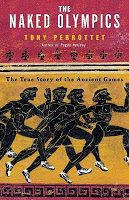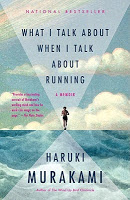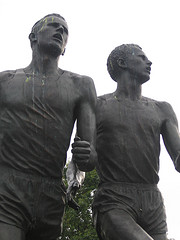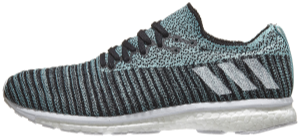I was at the library the other day with my daughter (a frequent activity in this family!), and came across the book “The Naked Olympics” by Tony Perrottet. The cover (see picture to the left) featured what looked like an ancient painting of a group of naked Greek runners (more on this below) in seemingly modern running shoes (still not sure what’s up with that), but I was intrigued and decided to take the book home with me. I wound up reading it in about a week, and it was quite enjoyable.
The Naked Olympics is basically a very readable historical account of what it was like to actually attend the Olympic festival in ancient Greece. It describes what it was like to be both a spectator and athlete, and goes through in detail the various events that comprised the Ancient Olympic Games. While my initial interest in this book was to see what the author had to say about the running events, I found the entire book to be very enjoyable, and full of interesting tidbits about the Games. Among other things, I learned:
1. The Ancient Greeks were wild about athletics, perhaps uniquely so in the ancient world.
2. Like the star athletes of modern times, Olympic champions were held in very high esteem, and were well taken care of financially.
3.The Ancient Greeks really liked to be naked, particularly when competing in athletic events. I have a hard time imagining how this could be comfortable while running, and although I’ve experimented a bit with running barefoot, I don’t suspect that I’ll be running a 5K in the buff anytime soon (though I really do want a new PR!).
4. The Ancient Greeks really loved their olive oil, and used it for purposes that went well beyond cooking (in particular, they liked to combine their use of olive oil with their penchant for being naked). I think I’ll pass on this as well.
5. Despite the picture on the cover of the book, the Ancient Greeks raced barefoot, and appeared to utilize a forefoot strike. I’m still puzzled by the painting on the cover depicting the runners in lace-up running shoes, though I did learn that Nike is the Greek Goddess of victory. I suspect Vibram was the Greek God of foot odor.
6. Death was not an uncommon occurrence for a competitor in the Ancient Olympics. This was apparently common in the chariot race, and also not uncommon among boxers and competitors in the pankration (a pretty much no-holds-barred brawl that I suppose is a predecessor of modern events like the UFC). Today’s Olympics are quite tame by comparison, though it might be an interesting twist if flogging were re-introduced as punishment for a false start in track races.
There’s a lot more of interest to be found in this book, and for anyone with an interest in the history of athletics, I highly recommend it. It’s a short, easy read, and well worth a trip to the library, Amazon, or you nearest locally owned book store.



















Just ordered for $0.33 used on Amazon :-) (shipping was $3.99 though.) Not a bad price either way though
Not bad – hope you like it!
Pete
Too bad we do not know their results. The Greeks competed in about 700 years, or something like that. They should also have gotten better over the years. I know that Nero won all the medals a year. But he was Roman.
/Johan
Johan,
They do report some of the Greek results in the books, but the author
admits that they were prone to embellishment. Still interesting to
read.
Pete